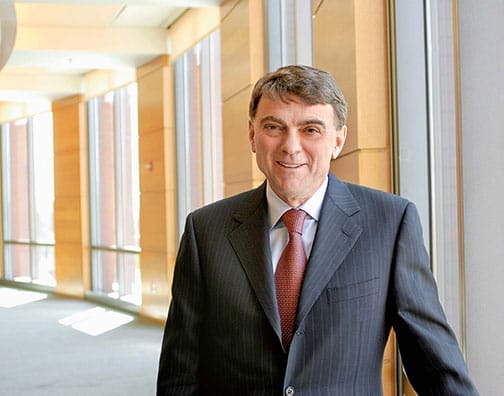Enjoy the Q&A below, and be sure to view our timeline of the dean’s tenure, “Celebrating the Legacy of Thomas S. Robertson.”
Q: After seven years as Wharton’s dean, you will step down at the end of this academic year and go back to teaching in the Marketing Department. What are you most looking forward to in this next chapter of your career?
Thomas S. Robertson: I look forward to rejoining the faculty, engaging with my colleagues, connecting with students through teaching and research, and continuing to champion the intellectual pursuits of the School as we seek to advance business education.
Q: Your deanship has been notable for many achievements. What has driven you these past seven years to strive for these accomplishments?
TSR: When I arrived back on campus, I had a clear sense of the Penn-Wharton mission, which was to maintain the School’s preeminence and move it in new directions that were compatible with the changes seen in the wider business and social policy environment. We initiated our three major priorities: globalization, innovation and social impact. It was important to execute these priorities to keep the School at the leading edge of knowledge and practice.
I began my tenure as dean in the summer of 2007, a time when the world was buoyed by a strong sense of economic optimism. But by the autumn of 2008, the economy was in crisis. Somehow we had to maintain our goals and budgets through that downturn, while not unduly constraining our resources. Sometimes things come out of left field, but one must respond to such events in a proactive and effective way.
As with any job, you always want to leave it in a better place. Ultimately, that has to be one’s legacy.
Q: As dean, you traveled around the globe on behalf of Wharton, meeting with executives, policymakers and thought leaders. Those experiences undoubtedly have given you a good sense of international economic issues. What are your hopes for the global economy?
TSR: One of the major economic challenges the world faces today is income inequality. This has to be resolved because it is the root cause of many of the world’s ills. If people are chronically disenfranchised, it is inherently difficult for economies to progress. Relatedly, if young people cannot find jobs, if they have no hope for their futures, this also drags down economies. Such situations can explode, as we have seen in recent years around the globe.
Q: How can business schools help in this regard?
TSR: Business schools play an important role in the world’s economy—they can act as a force for good. Indeed, business schools must be judged by how they create new knowledge that helps companies, social enterprises and governments become more effective and efficient, and to do so in a way that benefits economic interests.
Q: How do you view Wharton’s role in the world today?
TSR: At Wharton, our role is to create and disseminate new knowledge. A great diversity of students and faculty from around the world come here to engage in this work. As I walk around the School’s buildings and Penn’s campus, I am always impressed by how many people from different backgrounds and regions are here. Learning is maximized under conditions of diversity, and students, in turn, benefit from that. Diversity is key to the future success of the School, the University and the world.
The cross-disciplinary nature of our work also is very important. I believe that everyone at Wharton is proud to be part of Penn and its interdisciplinary research community, which is important in advancing the world’s knowledge.
Q: What is your vision for the School’s future?
TSR: Wharton has been in business for 133 years. Think about how different business is today compared with that in Joseph Wharton’s day. And 133 years from now, business will look very different from today. We must be responsive to emerging economies and industries, new technologies and new ways of thinking about commerce. We must always anticipate, embrace and champion change.
Q: Any words of advice for the next Wharton Dean?
TSR: I will give advice only if asked. It is important to let the new leader have a free hand, without being encumbered by the previous dean’s views.
Q: While you will be busy as a marketing professor, we assume you will have a bit more time on your hands. What will you do with that extra time?
TSR: I know that I must reinvent myself and accept new challenges, but to be honest, I have not had time to think about it because there is so much to do before the end of this academic year. Ask me again in a year.
Link to us: Read more from Dean Robertson at
www.wharton.upenn.edu/about/from-the-dean.cfm.

























